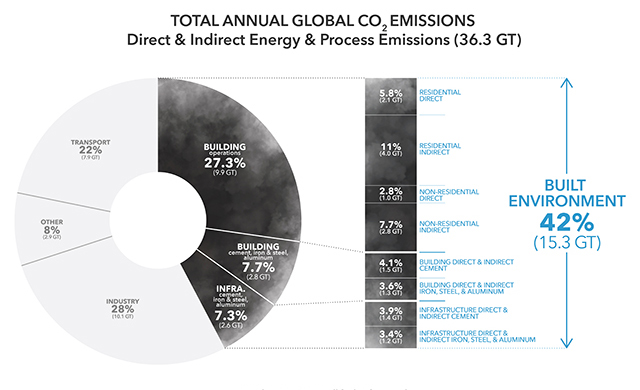

Experts from more than 190 countries around the world will gather in Dubai this month to brainstorm on ways to combat the climate crisis.
The 28th Conference of the Parties to the United Nations Framework Convention on Climate Change (COP28) is scheduled to take place in Dubai, from November 30 to December 12, 2023.
The event is expected to reinvigorate the global commitment to addressing climate change and to have significant implications for the built environment.
The built environment – which includes all human-made structures, such as buildings, roads, and bridges, as well as the infrastructure that supports them – is responsible for a significant portion of global greenhouse gas emissions right from the construction stages and the carbon embedded in building materials to the operational phase – with estimates varying from 37 per cent to 42 per cent.
The sector’s carbon footprint is a result of energy-intensive processes, such as manufacturing building materials, construction activities, and the operational energy used by buildings. While this places a significant level of blame for the climate crisis on the industry, the sector also can play a major role in mitigation.
With careful planning right from the design and tendering stages, the built environment can be made more sustainable. Global certification systems such as LEED (Leadership in Energy and Environmental Design), BREEAM (Building Research Establishment Environmental Assessment Method), DGNB (Deutsche Gesellschaft für nachhaltiges Bauen) and WELL, among others, provide guidance on how this can be achieved to ensure sustainable buildings that promote wellness, and cities planned with green spaces and features that help to reduce temperatures and improve air quality.
The implications of COP28 for the built environment can be significant, if agreements are reached to reduce greenhouse gas emissions, which could lead to a transformation of the way we design, build, and operate our cities and infrastructure. COP28 will likely emphasise the need for stringent policies, international collaboration, and transformative changes in construction practices to reduce the sector’s carbon impact and contribute to a more sustainable, resilient future.
The agenda for discussions on three days are relevant to the building and construction sector: On December 5, with the theme ‘Energy, Industry and Just Transition’, the focus will be on levers and pathways for rapid decarbonisation and just transition across the full energy and industrial value chains, accelerating economic and job growth. The package of outcomes will include massive deployment of renewable energy, greater energy efficiency, innovation and action for heavy-emitting sectors (including steel, cement, and aluminium), unlocking the potential of hydrogen and decarbonisation of oil and gas supplies.
On December 6, the programme entitled ‘Multilevel Action, Urbanization and Built Environment/Transport’ will feature a historic presence of local leaders, including mayors, governors, parliamentarians, business, and civil society leaders, united to accelerate climate action across all levels of government and society. The day will also highlight solutions to transition to low-carbon and resilient built environments and infrastructure, sustainable and circular waste systems.
Through the interlinked transport pillar, it will also seek more people-and-planet-friendly modes of mobility and freight. The day will particularly look at action in urban areas, where population growth, economic activity and greenhouse gas emissions converge.
On December 9, the focus will shift to ‘Nature, Land Use, and Oceans’ which are integral to achieving all the Paris Agreement’s goals. This, along with recent adoption of the 30 x 30 biodiversity goal, creates the need for an integrated policy and investment in climate change and nature. COP28 is expected to focus on delivering climate and nature co-benefits through a range of financing mechanisms and packages, co-designed with local and indigenous peoples, to sustainably manage and conserve natural carbon sinks and biodiversity hotpots. It will also seek to accelerate private sector commitments to nature-positive accountability frameworks.








.jpg)




.jpg)




























.jpg)





































